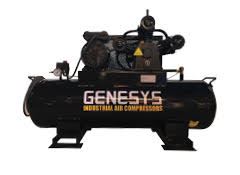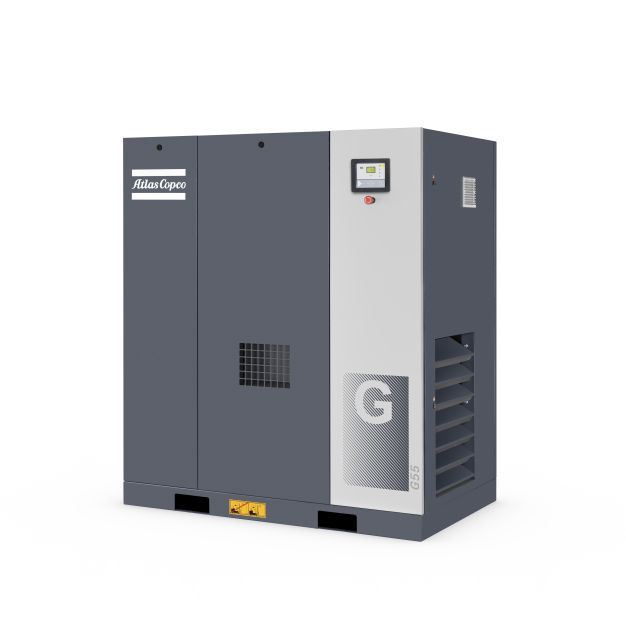Choosing the Best Air Compressor for the Job
13th Apr 2021
Selecting the right air compressor is influenced by a series of factors.
Determining how you will use your air compressor is a great starting point. Developing the list of tools that will function and those tools' applications is the next and vital guiding step.
To get your air supply right, you'll want to arm yourself with the proper knowledge, achieved through extensive research based on the tools, output and usage when choosing a compressor. Guiding this research will be the air consumption specification (measured in litres per minute (l/min) or cubic feet per minute (cfm)) together with the operational pressure (measured in bars (b) or pounds per square inch (psi)) of the tools planned for use with the compressor.
What Air Compressor Do You Need?
The purchase of an air compressor is influenced by several factors. Understanding these factors is key to making the best possible purchase to suit your needs.
Selecting the right compressor for your needs depends on the following factors:
- Determining what application you need an air compressor for; for air tools, trade & workshop or commercial and industrial use.
- Adding up the total air consumption of all the tools that will be powered simultaneously with the compressor
- Determining the recommended operating pressure of your tools and calculating the totals based on the simultaneous use
- Planning how to use the air tools - will they be run continuously or intermittently?
- The physicality of using the tools, for example, will the air compressor need to be portable, and will there be a power source on the site?
How To Choose The Best Air Compressor For The Task
For air compressors, consider these questions to guide an initial decision:
- How much pressure is required?
- How much airflow is required?
- What is the air quality required?
- What is the operating duty cycle?
- What is the initial purchase price?
- What is the total cost of ownership?
- What special requirements does this application demand?
To answer the first question, determining pressure requirements comes through comparing identified tools/uses with the manufacturer's specifications for pressure (psi, bar or kPa) and airflow (cfm, l/sec or m3/min). The results of this comparison provide the performance information that must remain at the forefront of this decision.
Types of Air Compressors
There are many types of air compressors on the market; the main air compressor types are
- Piston/reciprocal air compressors
- Screw/rotary screw compressors
- Portable/Mobile Air Compressors
Read on the understand the key features of each to aid in your decision making.
1. Piston Compressors
Piston compressors are robust and functional and have low maintenance costs. Piston Air Compressors can be petrol, diesel & electric powered.
How Does A Piston Air Compressor Produce Pressurized Air?
A piston air compressor generates compressed air through a simple process.
The piston pushes down, drawing air into the main cylinder, which then causes one of the two steel value discs to flexes downwards to allow the air to pass. When the piston moves upward again, the same steel value disc then flexes upwards to seal against the valve seat. The compressed air is then pushed through a hole in the valve seat and comes out to the end phase, ready for use.
Piston Compressor Applications
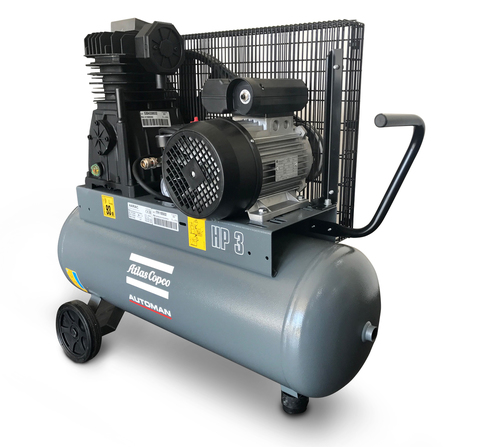 Piston air compressors are generally used for use with air tools, inflation & other low-medium air flow applications. They are often purchased for short-term or intermittent domestic and light industrial use due to their smaller size and weight, basic maintenance requirements and high noise levels.
Piston air compressors are generally used for use with air tools, inflation & other low-medium air flow applications. They are often purchased for short-term or intermittent domestic and light industrial use due to their smaller size and weight, basic maintenance requirements and high noise levels.
More specifically, the piston air compressor is found in a range of industries, such as diving, dental surgeries, automotive workshops, and agriculture, in addition to natural gas processing and delivery, chemical plants, and oil refineries.
Is a Piston and Reciprocal Air Compressor the Same Thing?
The piston and reciprocating air compressor are two names for the same machine.
The model is sometimes called a 'reciprocating' air compressor due to the piston's reciprocal movement when the machine is in use. The model can also be called a 'piston' air compressor that acknowledges the piston as a piece of the machine with its role in the cylinder to decrease volume and increase air pressure.
What is the Difference Between Piston and Screw Compressors?
The differences between the piston and screw compressors include a range of factors from how they compress air to duty cycle, service intervals and noise; understanding these differences is key to determining which model is best suited to your needs.
- Air Compression: The critical difference between a piston and screw air compressor is how they compress air. The piston air compressor uses pistons driven by a crankshaft while the screw compressors air using two meshing helical screws.
- Duty Cycle: The two models have vastly different duty cycles; for the piston compressor, they operate for several hours at a lower duty cycle requirement - although the newer models are designed for continuous duty, while the screw compressor is a model that runs continuously without an issue.
- Service Intervals: The servicing requirements for these two models are dependent on the variation of moving parts within the models. The piston compressor requires a more frequent servicing schedule due to the more significant number of moving parts; while the screw compressors have fewer moving parts, they also attract fewer services.
- Noise Levels: The piston is a loud air compressor, while the screw compressor is much quieter. This difference is one of the key elements that directly affect the price difference of these models.
Are Piston Compressors portable or usually operated in a stationary environment?
The piston compressors are available in models that offer maneuverability/portable and stationary – the option depends entirely on the compressor's size. Some smaller models have wheels that enable some portability, while some of the larger compressors, due to their size, are available only as stationary models. This information is typically displayed in the key features or specifications sections of most model description for customers to reference.
What do Piston Compressors Cost?
The piston or reciprocating air compressor is deemed the least expensive type of air compressor in terms of cost. With prices ranging from AUD 890.00 - AUD 4500.00, the model's simplicity and robust design make it a popular choice for smaller manufacturing facilities, workshops, body shops, and tyre shops.
2. Screw Compressors
Screw compressors are suitable for small to medium size industrial applications.
These air compressors are quiet, efficient, robust and reliable, ranging from 17CFM - 200+ and are available as either floor or mounted.
What Are Screw Compressors Used For?
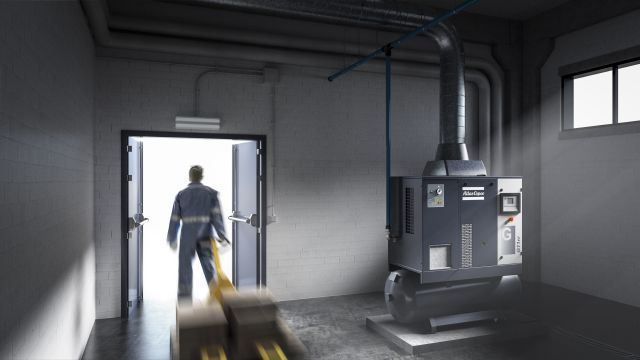 Generally, screw air compressors are installed when large volumes of high-pressure air are required in commercial and industrial applications or where high-power air tools are used (such as construction sites).
Generally, screw air compressors are installed when large volumes of high-pressure air are required in commercial and industrial applications or where high-power air tools are used (such as construction sites).
Some of the most common industries that utilise the screw compressor are food packaging factories and automated manufacturing systems.
This model provides a good fit for commercial and industrial use as they can withstand variations in the demand for pressurised air and are known for providing a continuous, steady load.
How Do Rotary Screw Compressors Work?
The rotary screw compressor contains twin elements that rotate in opposite directions - known as male and female parts. Air fills the gap between these rotors. As the rotation commences, the space between the rotors and the surrounding housing gets smaller.
The air compresses into this smaller space, which increases the pressure - thus creating pressurised air. Other elements that contribute to the pressure, including the length, pitch of the screw, and the discharge port's form, collectively determine the pressure ratio. With the rotary screw model, there are no additional valves or mechanical forces that can cause unbalance to the compression process.
So, screw compressors can comfortably operate at high speeds while maintaining a high flow rate even while packed into small exterior dimensions
Are Screw Compressors and Rotary Screw Compressor the same thing?
Yes! A two names for the same machine – the Screw Air Compressors, Rotary Screw Air Compressors refer all to the same piece of equipment.
Why is it called a Screw/Rotary Screw Compressor?
The compressor is referred to as a 'screw' or 'rotary screw' air compressor because of the machine's mechanisms that compress the air.
Technically speaking, a rotary-screw compressor uses two very closely meshing helical screws, known as rotors, to compress the air. The rotary screw traps the air between two meshed rotors and reduces its volume as it moves down through the rotors; this volume reduction results in compressed air. So, you can see why the names 'screw air compressor' and 'rotary-screw air compressor' describe this machine.
Why Are Screw Air Compressors Such Popular Choice For Small To Medium Size Industrial Operations?
There is a range of reasons the screw compressors remain a popular choice for small to medium-size industrial operations, because of their capability with:
- Withstanding demanding commercial and industrial environments
- Remaining robust and reliable even in taxing industrial settings; due to the high-quality components, parts and materials of which they contain
- Providing high-quality pressurized air even in touch with climatic conditions, such as those found throughout Australia.
- A range of floor mounted variants, tank-mounted variants, and or without integrated dryers
Small to medium-sized operations still look for some of the same features a residential buyer may look for; in that, they seek something compact, efficient, reliable, and quiet but with more agility in response to increasing loads and duty cycles.
Are screw air compressors normally portable?
The screw air compressor is typically a portable compression system. These models are typically mounted on trailers and often referred to as construction compressors due to their prevalent use in Australia's construction industry.
3. Portable/Mobile Air Compressors
Mobile air compressors are suitable for those seeking a product with mobility as a critical feature. These air compressors in a variety of different fuel types, features & CFM, HP ranges, from electric to diesel & petrol models to suit industry requirements and personal needs and personal needs.
What Are The Benefits Of Mobile Air Compressors?
Portable air compressors perform the crucial function of delivering compressed air to equipment and machinery wherever it is required. The benefits of a compressor with this capability are:
- Similar functionality and operational delivery to stationary counterparts
- Same safety features as stationary counterparts, which encourages complete trust in the machine’s capabilities
- Available in a range of tank sizes, CFM and PSI capabilities
- Often smaller and easer to maneuver sometimes equipped with wheels, some portable compressors can be transported by truck.
- Being portable does not decrease the durability or power of the compressor
Why are Mobile Air Compressors so Popular?
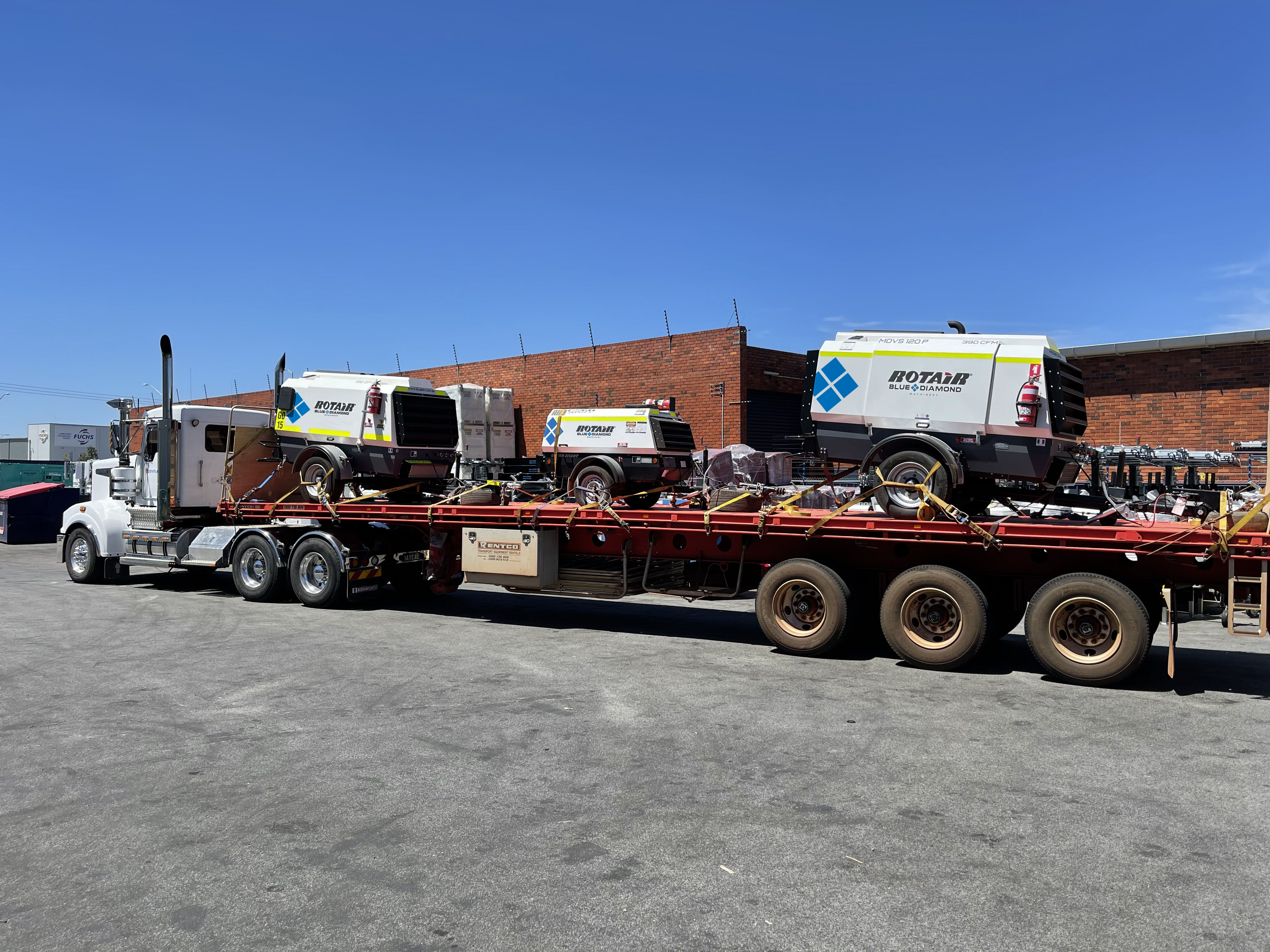
The mobile air compressor is a very popular purchase because of its ability to be used in more than one site making the purchase more economical, they are built tough and can withstand Australian conditions, so they last for longer terms – paired with long warranty periods which brings peace of mind when making large investments.
There are a range of reasons portable air compressors are so often purchased, here are some for consideration below:
- Modern design, machines are compact and durable
- Silent and comply with environment standards
- Low lifecycle cost
- Wide range of pressures, with dual pressure option
- Lowest acoustic pressure levels as indicated in current legislation provisions
- Emissions according to the latest parameters
- Accessibility for maintenance
- Intelligent System – avoids starting load on the engine and ensures low pressure shut down
- “No Key “control panel, one button to start the machine
- Anti-repetitiveness system on the engine start
- Avoids starter motor issues and improves starter motor life
- Centralized control panel for easy monitoring
- Manufactured in compliance with applicable international standards (CE, ASME, DOSH etc)
- Skid, axles of different types, with or without brakes, lights to be fit for road circulation under severe homologation parameters.
What Should I Ask Before Buying a Mobile Air Compressor?
Before purchasing a mobile air compressor, it is essential to discuss the considerations guiding your purchase with the manufacturer or consultants. Whether you have developed a buyers list yourself with the features and specs sought or require an initial consultation to determine the type of compressor that will suit your needs, this first step is crucial in determining a product that performs in the way required on your site. To help guide your purchase and ensure that the final product you settle can perform to your needs, we have developed some initial questions to ask:
- How long do you want the compressor to run before refuelling? Ask the manufacturer or consultant about the air compressor's fuel tank capacity/time and refuelling intervals; this will help determine the fuel tank capacity you need. Some of the portable models are equipped with a fuel-saving system. When compressed air is not required, the system allows compressing air at a much lower thus saving fuel consumption significantly, a great feature to ensure your model has.
- Where will the compressor need to go? Even though we are discussing portable compressors, there is still the size to consider. Think about the locations the compressor may need to go and the size of the vehicle - talk to the consultants about the maneuverability and transportation required for the model to match what you already have.
- What are the engine specifications required? From the number of cylinders to maximum speed, air intake system and horsepower, these are all points that you can bring to the manufacturer so they can match you with the portable options to suit your needs.
- Determining if a model is easy to maintain is key to ensuring the equipment's everyday operation is uneventful. A well setout compressor will be easy to clean and have a logical layout for maintenance checks. The maintenance information, description, and recommendations will be listed in the model features to reference, whether to research yourself or discuss with a consultant.
- Ease of use is another critical feature for a portable compressor, as it needs to set, moved and reset with relative speed and ease. Many of the models available have control boards that use a 'no key' system so the unit can be accessed, used, maintained and directed without ignition.
- Quality of a product - determining which country the product was made, manufactured or parts sought from is essential in determining the quality of the product being purchased. For example, communicating to your consultant the level of quality you seek and the information they can provide on warranties will result in homing in on a model that ticks the box.
Selecting the Best Air Compressor for Your Budget
Selecting the best air compressor for your budget is affected primarily by several key factors; design, pressure and flow, lubricated or oil-free and any special features. Generally, rotary screw tends to be more expensive than reciprocating compressors due to their capabilities increasing in workload and less requirement for maintenance.
To break down some of the financial outlay for an air compressor, as a rule the initial purchase price of an air compressor represents approximately 10% of the total costs to own and operate the compressor for the first five years.
The other considerations which may affect your decision are some important ongoing cost factors. When considering a purchase of an air compressor, there are three main areas to consider that will incur ongoing costs but are aside from the initial outlay for the machine. These are:
- Installation
- Maintenance
- Power
A general rule when selecting an air compressor, in relation to these ongoing costs is that a lower upfront cost can sometimes have higher on-going costs. While a higher up-front cost may have lower on-going costs.
Weighing up these factors will guide you on the most affordable financial route and if assistance is needed to guide this decision both the manufacturer and the Blue Diamond Machinery consultants can provide clear information about the general installation (if applicable), maintenance and power costs that you can incur to assist you in your decision.
Choose a Leading Air Compressor Supplier
Blue Diamond are an industry leading air compressor supplier, providing total air solutions to meet the needs of industry, workshop & commercial applications Australia wide. With a range of air compressors hand-picked only from trusted brands, excellent servicing & support, and great prices, it’s no surprise we are the trusted choice for 1000’s of Aussies.
No matter your compressed air needs, we will have an air compressor to suit. If you are unsure which air compressor is right for you, talk with our experienced sales team for the right advice to meet your requirements on 1300 936 025.
Contact Us for Expert Advice
It's important to ensure you select the right air compressor for your needs. So, if you have any questions or need some help please do not hesitate to call us on 1300 998 647




